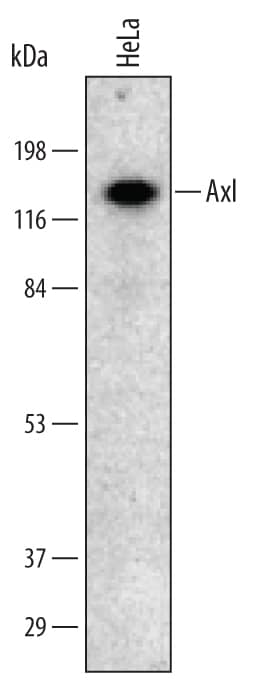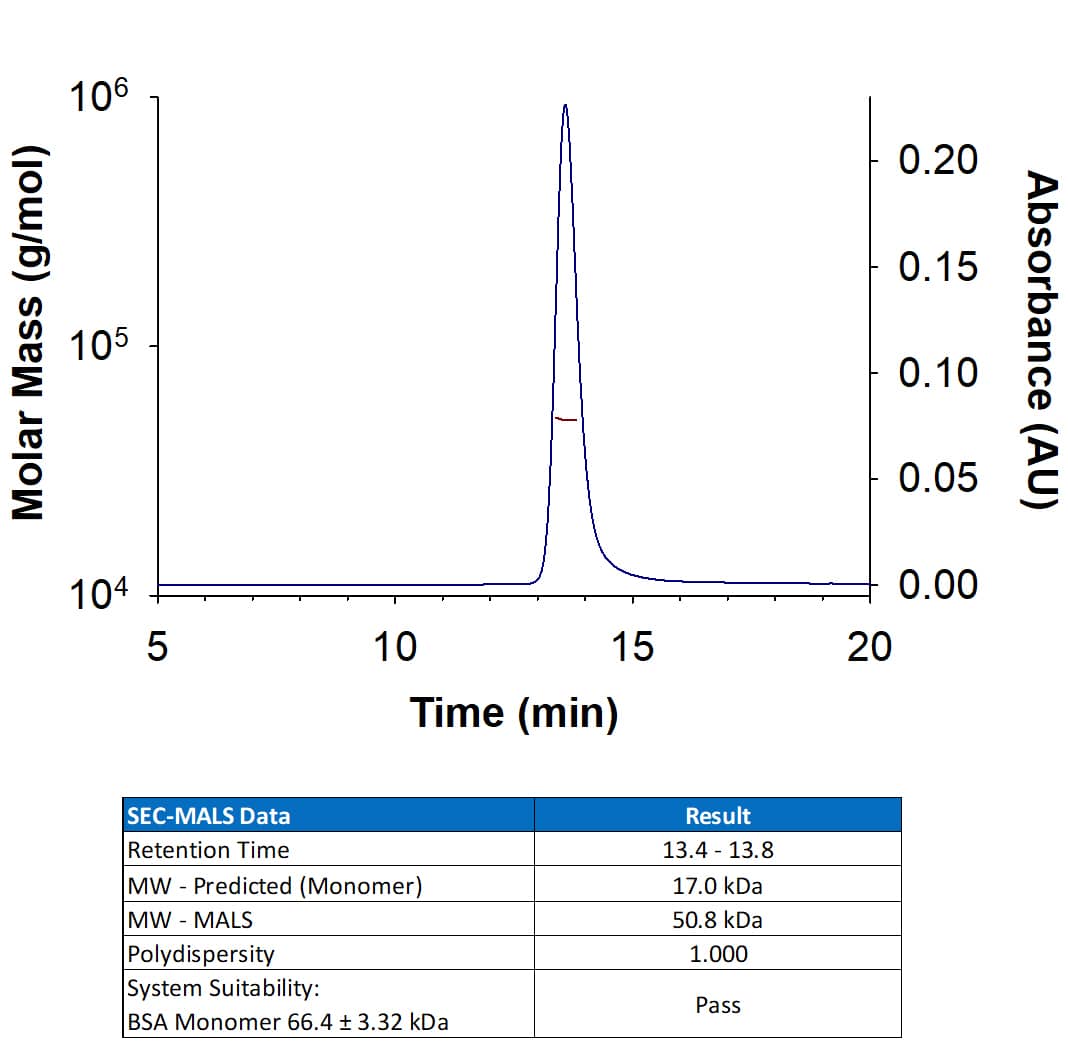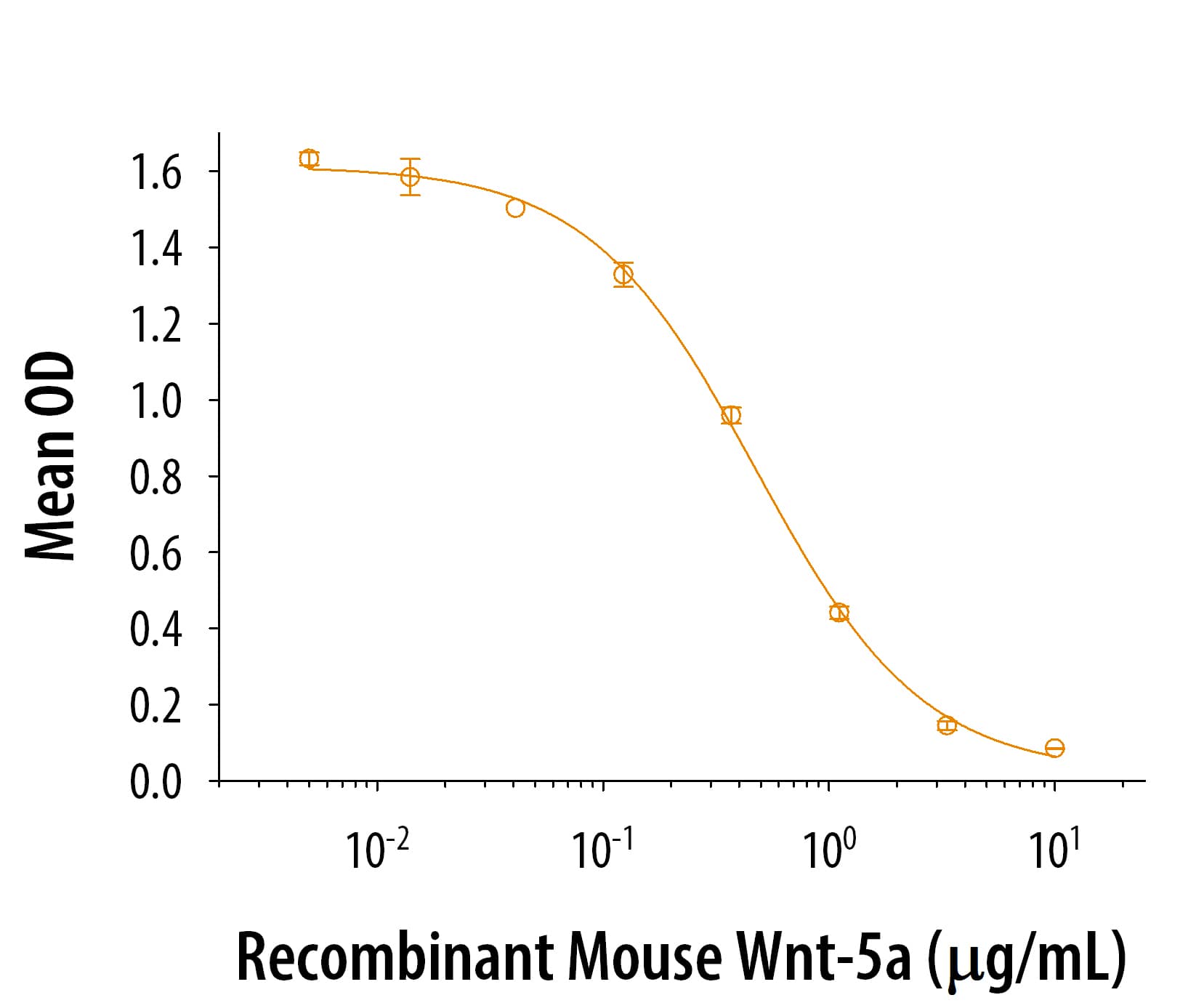Human ROR1 Antibody Summary
Ala24-Glu403
Accession # Q01973
Customers also Viewed
Applications
Please Note: Optimal dilutions should be determined by each laboratory for each application. General Protocols are available in the Technical Information section on our website.
Scientific Data
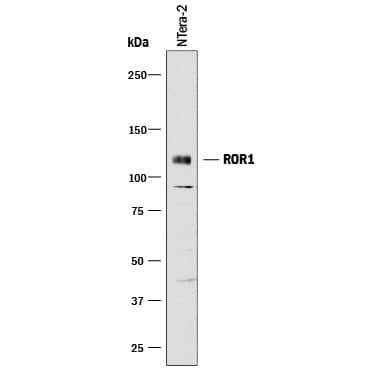 View Larger
View Larger
Detection of ROR1 by Western Blot. Western blot shows lysate of NTera-2 human testicular embryonic carcinoma cell line. PVDF membrane was probed with 1 µg/mL of Goat Anti-Human ROR1 Antigen Affinity-purified Polyclonal Antibody (Catalog # AF2000) followed by HRP-conjugated Anti-Goat IgG Secondary Antibody (HAF017). A specific band was detected for ROR1 at approximately 120 kDa (as indicated). This experiment was conducted under reducing conditions and using Immunoblot Buffer Group 1.
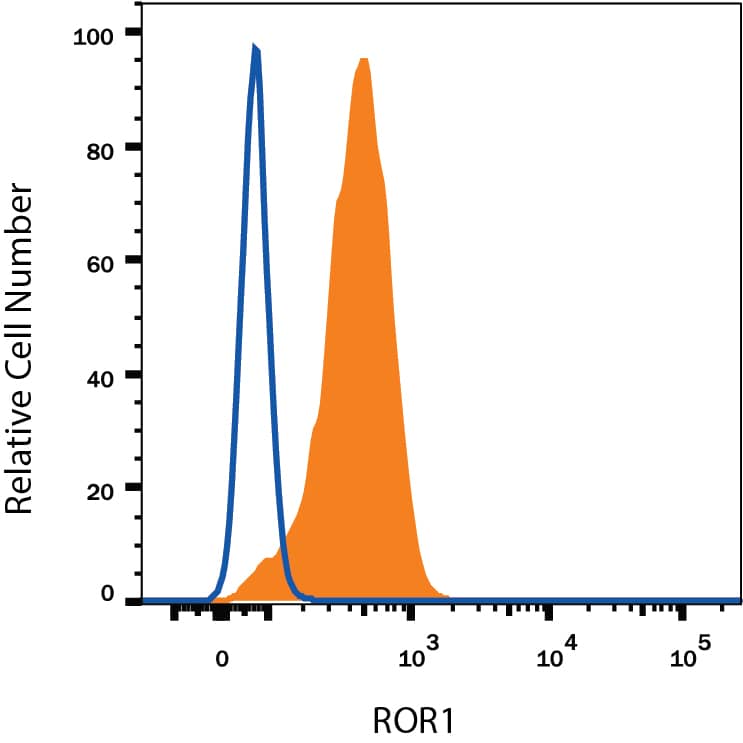 View Larger
View Larger
Detection of ROR1 in MDA‑MB‑231 Human Cell Line by Flow Cytometry. MDA-MB-231 human breast cancer cell line was stained with Goat Anti-Human ROR1 Antigen Affinity-purified Polyclonal Antibody (Catalog # AF2000, filled histogram) or isotype control antibody (AB-108-C, open histogram), followed by Phycoerythrin-conjugated Anti-Goat IgG Secondary Antibody (F0107). View our protocol for Staining Membrane-associated Proteins.
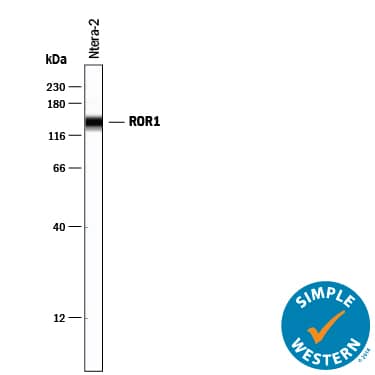 View Larger
View Larger
Detection of Human ROR1 by Simple WesternTM. Simple Western lane view shows lysates of NTera-2 human testicular embryonic carcinoma cell line, loaded at 0.2 mg/mL. A specific band was detected for ROR1 at approximately 143 kDa (as indicated) using 25 µg/mL of Goat Anti-Human ROR1 Antigen Affinity-purified Polyclonal Antibody (Catalog # AF2000) followed by 1:50 dilution of HRP-conjugated Anti-Goat IgG Secondary Antibody (HAF109). This experiment was conducted under reducing conditions and using the 12-230 kDa separation system.
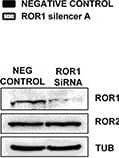 View Larger
View Larger
Detection of Human ROR1 by Knockdown Validated Knockdown of ROR1 in serous ovarian cancer cells decreases migrationA. ROR1 is decreased at the mRNA level following ROR1 siRNA (A) induced knockdown in serous ovarian cancer (OVCAR3) cells. No effect on ROR2 mRNA level. qRT-PCR was performed in triplicate and normalised to three different housekeeping genes (SDHA, HSPCB, RPL13A). Results represent an average of three experiments. Error bars represent the s.d of the mean. **P < 0.01. B. Densitometric analysis of ROR1 and ROR2 protein levels from three separate experiments. Representative immunoblots showing ROR1 knockdown at the protein level in OVCAR3 cells. No effect on ROR2 protein level. Top panel: ROR1, middle panel: ROR2, bottom panel: alpha -tubulin. C. Cell proliferation does not change following ROR1 knockdown in OVCAR3 cells over a 48–72 hour period. Results represent the average of three independent experiments. Error bars represent the s.d of the mean. D. ROR1 knockdown has no effect on the adhesion of OVCAR3 cells to collagen or fibronectin. Results represent the average of 3 experiments and error bars represent the s.d of the mean. E. Cell migration performed using the wound healing assay decreases following ROR1 knockdown in OVCAR3 cells. Results represent an average of three experiments. Error bars represent the s.d of the mean. *P < 0.05. F. Relative cell migration performed using the transwell migration assay is significantly decreased following ROR1 knockdown in OVCAR3 cells. Results represent an average of three experiments. Error bars represent the s.d of the mean. **P < 0.01. G. Relative cell invasion performed using the matrigel pre coated transwell assay is significantly decreased following ROR1 knockdown in OVCAR3 cells. Results represent the average of three experiments. Error bars represent the s.d of the mean. **P < 0.01. H. Representative picture of OVCAR3 cells invading matrigel over 48 hours. Image collected and cropped by CiteAb from the following publication (https://pubmed.ncbi.nlm.nih.gov/26515598), licensed under a CC-BY license. Not internally tested by R&D Systems.
Preparation and Storage
- 12 months from date of receipt, -20 to -70 °C as supplied.
- 1 month, 2 to 8 °C under sterile conditions after reconstitution.
- 6 months, -20 to -70 °C under sterile conditions after reconstitution.
Background: ROR1
ROR1 belongs to the ROR family of receptor tyrosine kinases, which are characterized by: the extracellular immunoglobulin domain, cysteine-rich domain that resembles the Wnt-binding sites of Frizzled proteins, kringle domain and intracellular kinase domain. Human ROR1 shares 97% and 58% amino acid sequence identity with mouse ROR1 and human ROR2, respectively.
Product Datasheets
Citations for Human ROR1 Antibody
R&D Systems personnel manually curate a database that contains references using R&D Systems products. The data collected includes not only links to publications in PubMed, but also provides information about sample types, species, and experimental conditions.
20
Citations: Showing 1 - 10
Filter your results:
Filter by:
-
Rho family small GTPase Rif regulates Wnt5a-Ror1-Dvl2 signaling and promotes lung adenocarcinoma progression
Authors: Nishita, M;Kamizaki, K;Hoshi, K;Aruga, K;Nishikaku, I;Shibuya, H;Matsumoto, K;Minami, Y;
The Journal of biological chemistry
Species: Human
Sample Types: Cell Lysates
Applications: Immunoprecipitation -
The Anti-ROR1 Monoclonal Antibody Zilovertamab Inhibits the Proliferation of Ovarian and Endometrial Cancer Cells
Authors: D Liu, GF Kaufmann, JB Breitmeyer, KA Dickson, DJ Marsh, CE Ford
Pharmaceutics, 2022-04-11;14(4):.
Species: Human
Sample Types: Whole Cells
Applications: Western Blot -
ROR1 is upregulated in endometrial cancer and represents a novel therapeutic target
Authors: D Liu, K Gunther, LA Enriquez, B Daniels, TA O'Mara, K Tang, AB Spurdle, CE Ford
Sci Rep, 2020-08-17;10(1):13906.
Species: Human
Sample Types: Cell Lysates
Applications: Western Blot -
Depletion of VPS35 attenuates metastasis of hepatocellular carcinoma by restraining the Wnt/PCP signaling pathway
Authors: Y Liu, H Deng, L Liang, G Zhang, J Xia, K Ding, N Tang, K Wang
Genes & diseases, 2020-07-25;8(2):232-240.
Species: Human
Sample Types: Cell Lysates, Whole Cells, Whole Tissue
Applications: ICC, IHC, Western Blot -
Deep Mining of Complex Antibody Phage Pools Generated by Cell Panning Enables Discovery of Rare Antibodies Binding New Targets and Epitopes
Authors: Anne Ljungars, Carolin Svensson, Anders Carlsson, Elin Birgersson, Ulla-Carin Tornberg, Björn Frendéus et al.
Frontiers in Pharmacology
-
Antibody-drug conjugate T-DM1 treatment for HER2+ breast cancer induces ROR1 and confers resistance through activation of Hippo transcriptional coactivator YAP1
Authors: SS Islam, M Uddin, ASM Noman, H Akter, NJ Dity, M Basiruzzma, F Uddin, J Ahsan, S Annoor, AA Alaiya, M Al-Alwan, H Yeger, WA Farhat
EBioMedicine, 2019-05-10;0(0):.
Species: Human
Sample Types: Cell Lysates, Whole Cells
Applications: ICC, Western Blot -
ROR1-CAVIN3 interaction required for caveolae-dependent endocytosis and pro-survival signaling in lung adenocarcinoma
Authors: T Yamaguchi, M Hayashi, L Ida, M Yamamoto, C Lu, T Kajino, J Cheng, M Nakatochi, H Isomura, M Yamazaki, M Suzuki, T Fujimoto, T Takahashi
Oncogene, 2019-03-20;0(0):.
Species: Human
Sample Types: Cell Lysates
Applications: Immunoprecipitation -
A receptor tyrosine kinase ROR1 inhibitor (KAN0439834) induced significant apoptosis of pancreatic cells which was enhanced by erlotinib and ibrutinib
Authors: AH Daneshmane, M Hojjat-Far, A Ghaderi, A Moshfegh, L Hansson, J Schultz, J Vågberg, S Byström, E Olsson, T Olin, A Österborg, H Mellstedt
PLoS ONE, 2018-06-01;13(6):e0198038.
Species: Human
Sample Types: Cell Lysates
Applications: Western Blot -
Maintenance and pharmacologic targeting of ROR1 protein levels via UHRF1 in t(1;19) pre-B-ALL
Authors: M Chow, L Gao, JD MacManiman, VT Bicocca, BH Chang, JJ Alumkal, JW Tyner
Oncogene, 2018-05-30;0(0):.
Species: Human
Sample Types: Cell Lysates
Applications: Immunoprecipitation, Western Blot -
ROR1 and ROR2 play distinct and opposing roles in endometrial cancer
Authors: CE Henry, E Llamosas, B Daniels, A Coopes, K Tang, CE Ford
Gynecol. Oncol., 2018-02-01;0(0):.
Species: Human
Sample Types: Cell Lysates
Applications: Western Blot -
Interaction between ROR1 and MuSK activation complex in myogenic cells
Authors: H Karvonen, K Summala, W Niininen, HR Barker, D Ungureanu
FEBS Lett., 2018-01-14;0(0):.
Species: Human
Sample Types: Cell Lysates
Applications: Immunoprecipitation, Western Blot -
Silencing ROR1 and ROR2 inhibits invasion and adhesion in an organotypic model of ovarian cancer metastasis
Authors: C Henry, N Hacker, C Ford
Oncotarget, 2017-11-20;8(68):112727-112738.
Species: Human
Sample Types: Cell Lysates
Applications: Western Blot -
ROR1 sustains caveolae and survival signalling as a scaffold of cavin-1 and caveolin-1
Authors: T Yamaguchi, C Lu, L Ida, K Yanagisawa, J Usukura, J Cheng, N Hotta, Y Shimada, H Isomura, M Suzuki, T Fujimoto, T Takahashi
Nat Commun, 2016-01-04;7(0):10060.
Species: Human
Sample Types: Cell Lysates
Applications: Immunoprecipitation -
Targeting the ROR1 and ROR2 receptors in epithelial ovarian cancer inhibits cell migration and invasion.
Authors: Henry C, Llamosas E, Knipprath-Meszaros A, Schoetzau A, Obermann E, Fuenfschilling M, Caduff R, Fink D, Hacker N, Ward R, Heinzelmann-Schwarz V, Ford C
Oncotarget, 2015-11-24;6(37):40310-26.
Species: Human
Sample Types: Cell Lysates
Applications: Western Blot -
Immunoprecipitation of ROR1
Authors: Vincent T Bicocca, Jeffrey W Tyner
BIO-PROTOCOL
-
ROR1 Flow Cytometry
Authors: Vincent T Bicocca, Jeffrey W Tyner
BIO-PROTOCOL
-
Targeting malignant B cells with an immunotoxin against ROR1
Authors: Sivasubramanian Baskar, Adrian Wiestner, Wyndham H. Wilson, Ira Pastan, Christoph Rader
mAbs
-
Ror1 is a pseudokinase that is crucial for met-driven tumorigenesis.
Authors: Gentile A, Lazzari L, Benvenuti S, Trusolino L, Comoglio PM
Cancer Res., 2011-04-12;71(8):3132-41.
Species: Human
Sample Types: Cell Lysates
Applications: Immunoprecipitation, Western Blot -
The B-cell tumor-associated antigen ROR1 can be targeted with T cells modified to express a ROR1-specific chimeric antigen receptor.
Authors: Hudecek M, Schmitt TM, Baskar S
Blood, 2010-08-11;116(22):4532-41.
Species: Human
Sample Types: Whole Cells
Applications: Flow Cytometry -
Unique cell surface expression of receptor tyrosine kinase ROR1 in human B-cell chronic lymphocytic leukemia.
Authors: Baskar S, Kwong KY, Hofer T, Levy JM, Kennedy MG, Lee E, Staudt LM, Wilson WH, Wiestner A, Rader C
Clin. Cancer Res., 2008-01-15;14(2):396-404.
Species: Human
Sample Types: Whole Cells
Applications: Flow Cytometry
FAQs
No product specific FAQs exist for this product, however you may
View all Antibody FAQsIsotype Controls
Reconstitution Buffers
Secondary Antibodies
Reviews for Human ROR1 Antibody
There are currently no reviews for this product. Be the first to review Human ROR1 Antibody and earn rewards!
Have you used Human ROR1 Antibody?
Submit a review and receive an Amazon gift card.
$25/€18/£15/$25CAN/¥75 Yuan/¥2500 Yen for a review with an image
$10/€7/£6/$10 CAD/¥70 Yuan/¥1110 Yen for a review without an image


